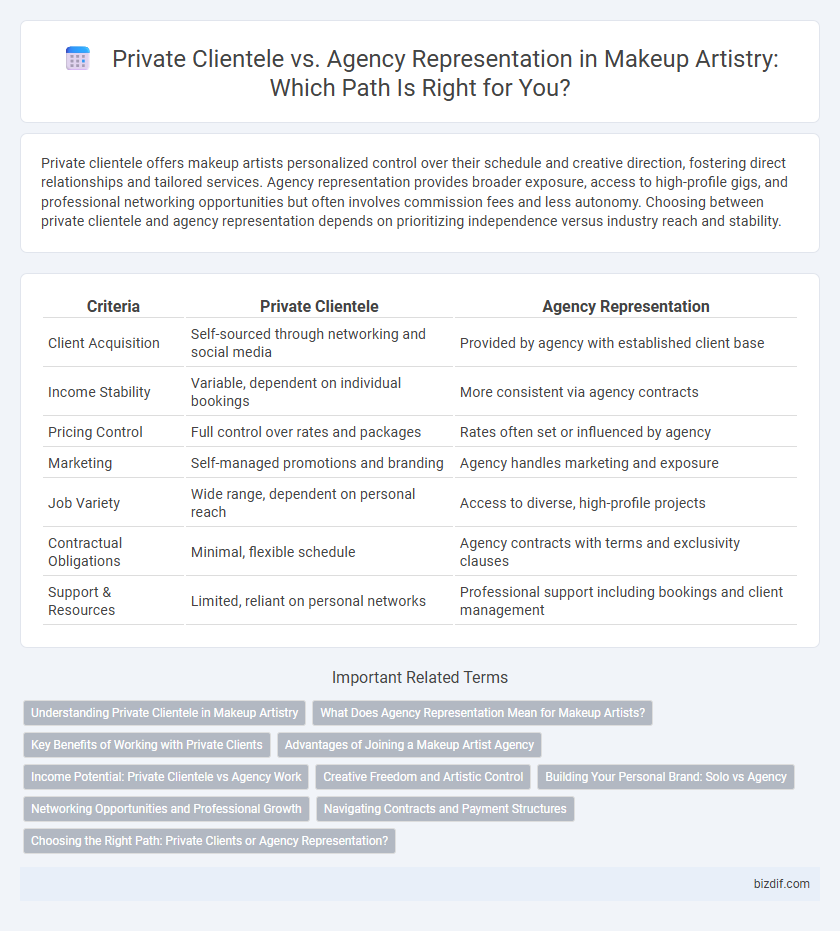Private clientele offers makeup artists personalized control over their schedule and creative direction, fostering direct relationships and tailored services. Agency representation provides broader exposure, access to high-profile gigs, and professional networking opportunities but often involves commission fees and less autonomy. Choosing between private clientele and agency representation depends on prioritizing independence versus industry reach and stability.
Table of Comparison
| Criteria | Private Clientele | Agency Representation |
|---|---|---|
| Client Acquisition | Self-sourced through networking and social media | Provided by agency with established client base |
| Income Stability | Variable, dependent on individual bookings | More consistent via agency contracts |
| Pricing Control | Full control over rates and packages | Rates often set or influenced by agency |
| Marketing | Self-managed promotions and branding | Agency handles marketing and exposure |
| Job Variety | Wide range, dependent on personal reach | Access to diverse, high-profile projects |
| Contractual Obligations | Minimal, flexible schedule | Agency contracts with terms and exclusivity clauses |
| Support & Resources | Limited, reliant on personal networks | Professional support including bookings and client management |
Understanding Private Clientele in Makeup Artistry
Understanding private clientele in makeup artistry involves personalized service tailored to individual preferences, ensuring unique looks that enhance each client's natural features. Building strong, direct relationships allows artists to gain deeper insights into clients' lifestyle and aesthetic goals, fostering trust and satisfaction. This approach often results in higher client retention and tailored marketing opportunities compared to agency representation.
What Does Agency Representation Mean for Makeup Artists?
Agency representation for makeup artists means access to a broader network of high-profile clients, consistent job opportunities, and professional brand growth through vetted industry connections. Agencies handle contract negotiations, scheduling, and marketing, allowing artists to focus solely on their creative work and skill development. This structured support system often leads to higher earnings and increased visibility in competitive markets compared to managing a private clientele independently.
Key Benefits of Working with Private Clients
Working with private clients in makeup artistry offers personalized creative freedom, allowing artists to tailor each look to individual preferences and unique occasions, fostering stronger client relationships. Private clientele often provide flexible scheduling and higher direct earnings without agency commissions, maximizing income potential. This approach enhances portfolio diversity and builds a loyal customer base through word-of-mouth referrals and customized service.
Advantages of Joining a Makeup Artist Agency
Joining a makeup artist agency offers increased exposure to high-profile clients and professional networks, enhancing career growth opportunities. Agencies provide consistent job bookings, access to exclusive projects, and reliable payment structures, reducing the uncertainty faced by private clientele artists. Additionally, agencies offer marketing support, brand collaborations, and skill development resources, elevating a makeup artist's market value and industry credibility.
Income Potential: Private Clientele vs Agency Work
Private clientele typically offers higher income potential due to personalized rates and repeat business, allowing makeup artists to set premium fees. Agency representation provides a steady stream of projects with consistent payment but often involves commission fees that reduce overall earnings. Balancing private clients with agency work can maximize income by combining high-paying personalized jobs with reliable agency bookings.
Creative Freedom and Artistic Control
Private clientele offers makeup artists unparalleled creative freedom and artistic control, allowing personalized, innovative looks tailored specifically to individual clients. Agency representation often requires adherence to brand guidelines and client specifications, which can limit experimental approaches and artistic expression. Balancing private and agency work enables artists to develop versatility while maintaining a strong personal style.
Building Your Personal Brand: Solo vs Agency
Building your personal brand as a makeup artist through private clientele offers complete creative control and direct client relationships that foster personalized trust and tailored services. Agency representation provides access to broader networks, steady job opportunities, and professional exposure, but may limit individual style and client interaction. Balancing solo work with agency projects can maximize brand growth by combining personal authenticity with industry reach.
Networking Opportunities and Professional Growth
Working with private clientele allows makeup artists to build personalized relationships and tailor services to individual needs, fostering deep trust and repeat business. Agency representation offers broader networking opportunities by connecting artists to high-profile clients, fashion shows, and commercial projects, accelerating professional growth. Both paths provide unique industry exposure, but agency affiliation often leads to faster access to diverse and large-scale assignments.
Navigating Contracts and Payment Structures
Navigating contracts in makeup artistry requires careful attention to payment structures, whether working with private clientele or agency representation. Private clients often involve direct agreements with individualized payment terms, including deposits and hourly rates, while agencies typically offer standardized contracts with set commission fees and scheduled payments. Understanding the nuances in contract clauses and payment timelines helps ensure secure compensation and protects professional interests in both scenarios.
Choosing the Right Path: Private Clients or Agency Representation?
Choosing between private clientele and agency representation in makeup artistry depends on career goals and work style preferences. Private clients offer personalized projects and flexible scheduling, often leading to higher earning potential per job but requiring self-promotion and client management. Agency representation provides steady job opportunities, access to high-profile gigs, and professional networking but typically involves commission fees and less control over assignments.
Private clientele vs Agency representation Infographic

 bizdif.com
bizdif.com